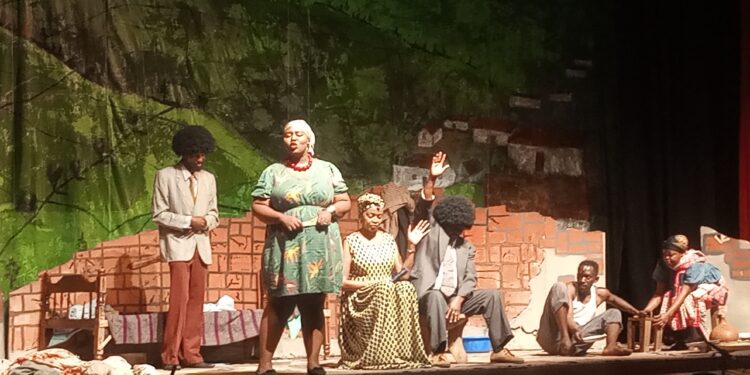“What you are witnessing is a living history,” said Ngugi wa Thiong’o, in his recorded message all the way from California introducing his old play I Will Marry When I Want to a new audience at the Kenya National Theatre. It really is a living history, this play in particular, because it was written in changing times about changing times that keep changing. There was palpable excitement in the theatre, boosted by the play’s beginning with the cast arriving from the same entrances that we did, dancing and singing and high-fiving their audience. I turned to the smiling stranger beside me and remarked, “What a way to open up a show, right?”
I Will Marry When I Want is a 1977 play written by the great Ngugi wa Thiong’o and the equally great, lesser known Ngugi wa Mirii (who’s widow was in attendance). Hastily banned, and the authors thrown in jail for a year too, the play managed to remain alive through the decades, on the written page, printed and reprinted, and only recently performed on stage once again for the first time back in May. It was such a hit that due to public demand, and looking at the packed auditorium the public sure had appetite and demand for this, it was brought back again for a limited run in October. Clearly, something clicks about this narrative. Something about I Will Marry When I Want leaves an indelible mark on the two or three generations that have kept it alive. Also, let’s not kid ourselves regarding the amount of pull and respect it’s author Ngugi wa Thiong’o commands.
I have much to say about the production, as I have much to say about the play. This was the first time I’d ever experienced it, either in written word or performed (obviously), and walking into it I imagined what it might be like. I avoided reading anything about it except the performance date and time. The title evokes gender politics. I imagined the story of a traditional woman waking up to the sound of dowry cattle in her father’s shamba and subsequently fighting for her maiden rights. Anybody familiar with the play would laugh at this because in lieu of the obvious gender politics it’s title provokes, I Will Marry When I Want is about religious politics and the socio-economic hardships that sprung from that for the militarily weak African man.
I am sure plenty has been written in academic books by distinguished professors about this landmark work but that nonetheless, doesn’t stop me from critiquing a play that’s held in the same weight bracket as its subject matter – religiously infallible. To spell out the title of my thesis: “I Did Not Enjoy I Will Marry When I Want.” Subheading: “At least not as much as I ought to.” This thesis will contain explanations as to why I found the play underwhelming, in two parts. First, I’ll talk about the text, that great Kenyan literary relic of anti-subtlety, then second, I’ll get into the performance.
The story centres around four couples – a middle-aged couple, Kiguunda (Bilal Mwaura) and Wangeci (Nice Githinji); their friends, the factory worker Gicaamba (Martin Kigondu) and his wife Njoki (Victoria Gichora); the upwardly mobile folk Kioi (Humphrey Maina) and Jezebel (Angel Waruinge), a very apt choice of name and the children of the first and last couple, Gathoni, the daughter of Kiguunda, and John, the son of Jezebel. It starts off with domestic quarrels in the hut-hold of Kiguunda and Wangeci. They chastise their daughter Gathoni over her perceived prioritising of material and Western values, seeing as how she’s dating the son of the elite class. She disobeys their orders flagrantly and goes on a trip with the boy to Mombasa. The couple are then visited by their friends, the factory worker Gicaamba and his wife Njoki, with Gicaamba basically being a mouthpiece for the author himself.
This character Gicaamba I find a little tedious, in that he is more intelligent than his frame allows him to be. He waxes eloquent on social injustices and when he speaks it’s not only the characters in the play that are listening but also the entire audience. We are rapt with his ideas, his rage, and his impotence. We pity his immobility but laugh at his jokes. He speaks for all us, in a way, but he is not one of us. Perhaps if his points were made more crudely, and with less erudition, we could even see ourselves in him. That way he would’ve been more believable, and galvanising. Kigondu, the actor who plays him however does so with outstanding gusto.
Kiguunda and Wangeci are then visited by the oft-spoken about privileged duo, who ask them to join their religion and certify their marriage in a church. Aha! I will marry when want. And Kiguunda does make that statement known to them, in so many words, to say the least. The story then follows tragedy after tragedy and leaves our assortment of endeared characters drunks and barmaids. There is little hope at the end of this story, despite what anybody else may tell you, but it’s true and it mirrors our reality, which is, also, still attempting to find hope wherever it may be hiding.
There are undertones of passive aggression in Kiguunda and Wangeci’s attitude toward their daughter, which we could take as their attitude towards their spawn generation. They call them spoiled and complacent in Western domination, but what are they actually to do? Who’s fault is it anyway? This attitude isn’t novel to any of us, particularly to millennials and us Gen Z’s. It’s trickled down like biblical curses; the more the globalisation, the less the identity and the more the anger. I Will Marry When I Want seems, to me, a reaction not only against the Christian invasion into African communities, but against the invasion of international life into our psyche. The play makes it evident that the pointed finger charging that passive aggression belongs largely to hypocrites, because if they could see a way forward for themselves, some advancement, some acceptance in the large all engulfing new world order, they’d take it without batting an eye. They’d marry right there in the church, before the wooden cross and the sweating minister. But this story is also about love, and they eventually accept their daughter, purge their righteous resentment and allow her to marry first. That, also, doesn’t go exactly to plan.
Now, let’s talk about the stage production. Directed by Stuart Nash, I Will Marry When I Want is one of the latest additions in the long line of productions under his belt. They began rehearsals nearly two years ago before being cut short due to that pesky pandemic. This play has, apparently, been performed for high schools all over the country, at the Kenya National Theatre in May, and now in October. It’s essentially a touring company, efficient and well-staged. The efficiency, it seems, comes at a cost. The cost: a largely pedestrian play. Granted, it’s often difficult to distinguish where to place the blame, on the playwright, the director, or the actors.
The play is performed with flourish by the aforementioned cast, among others. There were performances in both the original Gikuyu and in English. And I can only speak for the English version (which was the only version I could understand) when I say that the cast did their best, which just happened to be oftentimes, not good enough. The scenes are divided by dance sequences in which the matte painted backdrop is lifted up revealing a smaller raised stage where stories are told through song and dance. Those moments are lively, but the effect begins to wear off after a few stabs.
The tone and cadence of the play is hyper realistic, yet somehow manages not to get lost in anachronism. I found that aspect underwhelming, and supposed that there must have been poetry in the play, then asked myself why in the hell I couldn’t feel any of it. It was too direct, too ‘gung ho’, and not at all restrained or tentative, or emotionally elegiac, as I imagine it could’ve been reappropriated, if not already so in the text. This production is efficient because it’s easily staged, let’s be honest. There are no complicated lighting cues, choreography, or sound design which, while being the more interestingly utilised here, was limited to police sirens and gunshots. An irony of metatextual levels – a conservative production of a revolutionary liberal play. After the show, the theatre company, Nairobi Performing Art Studio, announced several upcoming shows culminating in a stage version of Nairobi Half Life, something I defy them to make even more efficient.
As I said earlier there isn’t a lot of hope at the end of I Will Marry When I Want. Kiguunda is relegated to being a drunkard after his daughter is called a whore, and his wife, companions, and even that brilliant factory worker, helplessly watch from the sidelines.
Enjoyed this article?
To receive the latest updates from Sinema Focus directly to your inbox, subscribe now.











